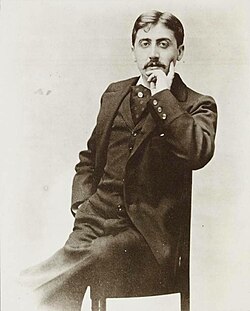Marcel Proust Quote
There were some that were of so rare a beauty that my pleasure on catching sight of them was enhanced by surprise. By what privilege, on one morning rather than another, did the window on being uncurtained disclose to my wondering eyes the nymph Glauconome, whose lazy beauty, gently breathing, had the transparence of a vaporous emerald beneath whose surface I could see teeming the ponderable elements that coloured it? She made the sun join in her play, with a smile rendered languorous by an invisible haze which was nought but a space kept vacant about her translucent surface, which, thus curtailed, became more appealing, like those goddesses whom the sculptor carves in relief upon a block of marble, the rest of which he leaves unchiselled. So, in her matchless colour, she invited us out over those rough terrestrial roads, from which, seated beside Mme. de Villeparisis in her barouche, we should see, all day long and without ever reaching it, the coolness of her gentle palpitation.
There were some that were of so rare a beauty that my pleasure on catching sight of them was enhanced by surprise. By what privilege, on one morning rather than another, did the window on being uncurtained disclose to my wondering eyes the nymph Glauconome, whose lazy beauty, gently breathing, had the transparence of a vaporous emerald beneath whose surface I could see teeming the ponderable elements that coloured it? She made the sun join in her play, with a smile rendered languorous by an invisible haze which was nought but a space kept vacant about her translucent surface, which, thus curtailed, became more appealing, like those goddesses whom the sculptor carves in relief upon a block of marble, the rest of which he leaves unchiselled. So, in her matchless colour, she invited us out over those rough terrestrial roads, from which, seated beside Mme. de Villeparisis in her barouche, we should see, all day long and without ever reaching it, the coolness of her gentle palpitation.
Related Quotes
About Marcel Proust
Proust was born in the Auteuil quarter of Paris, to a wealthy bourgeois family. His father, Adrien Proust, was a prominent pathologist and epidemiologist who studied cholera. His mother, Jeanne Clémence Weil, was from a prosperous Jewish family. Proust was raised in his father's Catholic faith, though he later became an atheist. From a young age, he struggled with severe asthma attacks which caused him to have a disrupted education. As a young man, Proust cultivated interests in literature and writing while moving in elite Parisian high society salons frequented by aristocrats and the upper bourgeoisie. These social connections provided inspiration and material for his later novel. His first works, including the collection of stories Les plaisirs et les jours, were published in the 1890s to little public success.
In 1908, Proust began work on À la recherche du temps perdu. The novel consists of seven volumes totaling around 1.25 million words and featuring 2,000 characters. It explores themes of memory, art, love, High Society and the human experience through the narrator's recollections. Begun when Proust was 38, the novel was partially published in his lifetime, with the initial sections appearing in 1913. The remaining volumes were revised and published posthumously by his brother Robert based on drafts and proofs. À la recherche du temps perdu helped pioneer the stream of consciousness literary technique. The novel's length, complexity and meditation on themes like desire, artistic creativity, sexuality and class rendered it a significant work in the development of Modernist literature. The work was translated into English by C. K. Scott Moncrieff and others.
Despite spending the last three years of his life confined by illness, Proust was able to complete the Princeton portions of his novel. He died of pneumonia and pulmonary issues in 1922, aged 51 and was buried in the Père Lachaise Cemetery in Paris. Proust's sexuality and relationships with men were an open secret among his social circles, though the author himself never publicly acknowledged being homosexual.
